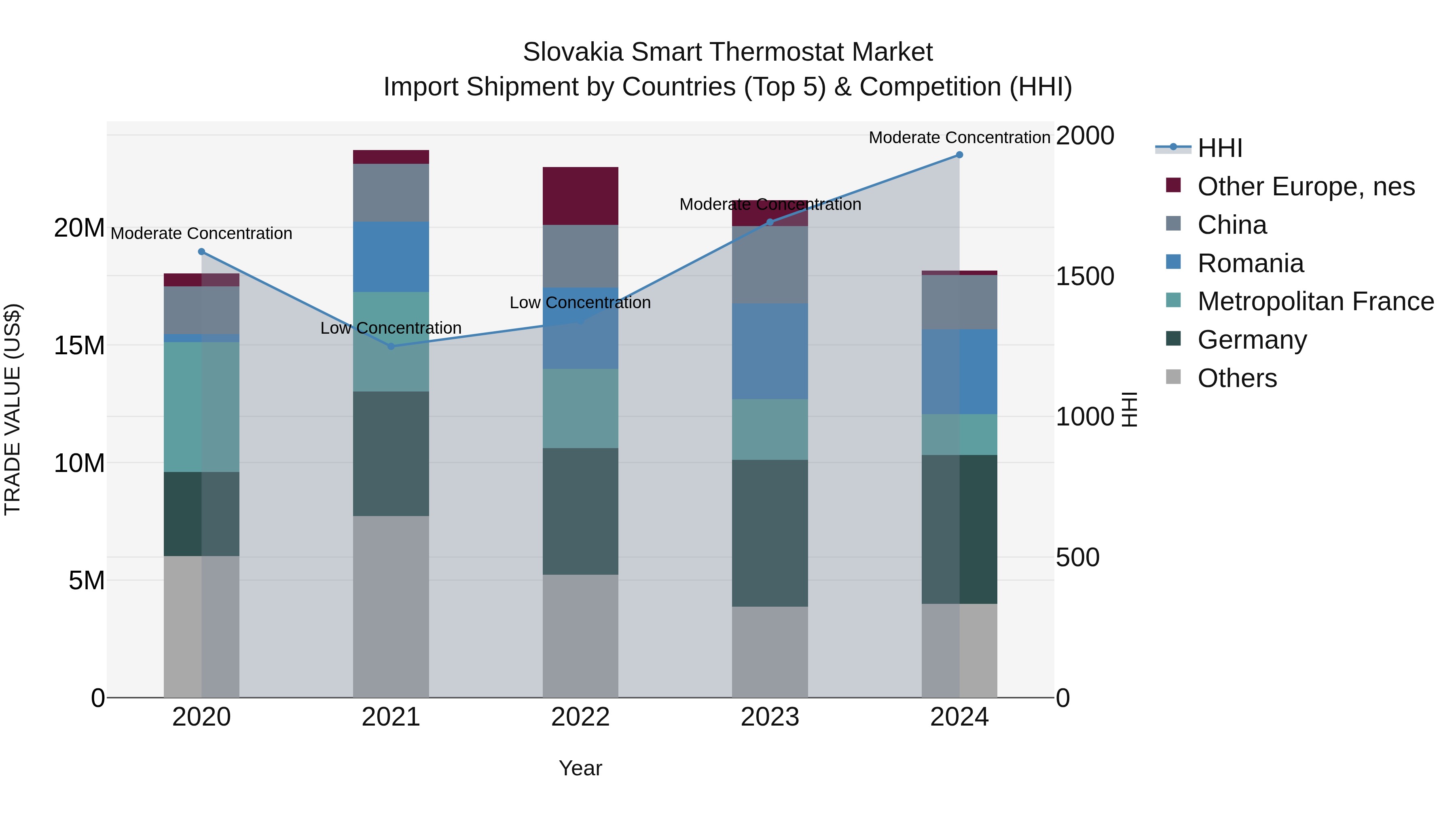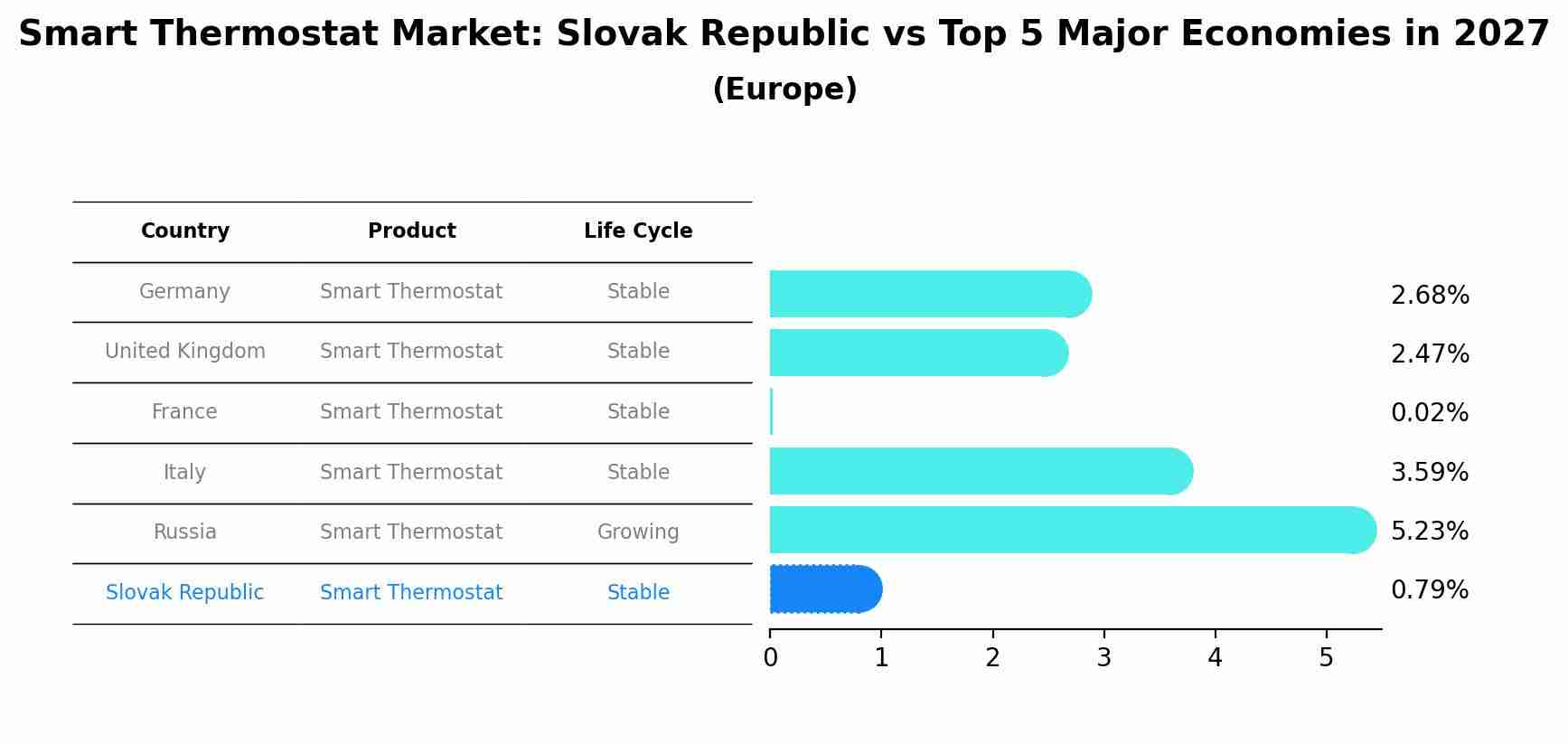Slovakia Smart Thermostat Market Outlook | Industry, Value, Revenue, Growth, Forecast, Share, Companies, COVID-19 IMPACT, Size, Trends & Analysis
| Product Code: ETC369500 | Publication Date: Aug 2022 | Updated Date: Nov 2025 | Product Type: Market Research Report | |
| Publisher: 6Wresearch | Author: Bhawna Singh | No. of Pages: 75 | No. of Figures: 35 | No. of Tables: 20 |
Slovakia Smart Thermostat Market Top 5 Importing Countries and Market Competition (HHI) Analysis
In 2024, Slovakia continued to see a steady flow of smart thermostat imports from top countries such as Germany, Romania, China, Metropolitan France, and Czechia. The Market Top 5 Importing Countries and Market Competition (HHI) Analysis showed moderate concentration with a stable Herfindahl-Hirschman Index (HHI). Despite a slight overall growth with a CAGR of 0.16% from 2020-2024, there was a concerning decline in the growth rate from 2023-2024 at -14.18%. This trend suggests a potential slowdown in the smart thermostat import Market Top 5 Importing Countries and Market Competition (HHI) Analysis in Slovakia, highlighting the need for further analysis and strategic planning in the industry.

Smart Thermostat Market: Slovak Republic vs Top 5 Major Economies in 2027 (Europe)
By 2027, Slovak Republic's Smart Thermostat market is forecasted to achieve a stable growth rate of 0.79%, with Germany leading the Europe region, followed by United Kingdom, France, Italy and Russia.

Slovakia Smart Thermostat Market Synopsis
The Slovakia Smart Thermostat Market is experiencing steady growth driven by increasing awareness of energy efficiency and the adoption of smart home technologies. The market is characterized by a growing demand for connected devices that offer remote access and energy-saving features. Consumers in Slovakia are increasingly looking for ways to reduce their energy consumption and lower utility costs, driving the adoption of smart thermostats. Key players in the market are focusing on product innovation, such as integration with voice assistants and advanced scheduling capabilities, to cater to the evolving needs of consumers. The market is expected to continue its growth trajectory as smart home adoption increases and government initiatives promoting energy efficiency gain traction in Slovakia.
Slovakia Smart Thermostat Market Trends
The Slovakia Smart Thermostat Market is witnessing a growing demand for energy-efficient and connected home solutions. Consumers are increasingly looking for smart thermostats that offer remote access and control via smartphones and voice assistants, such as Google Home and Amazon Alexa. This trend is driven by the increasing awareness of energy conservation and the desire for greater convenience in managing home heating and cooling systems. Additionally, there is a growing emphasis on the integration of smart thermostats with smart home ecosystems, enabling seamless automation and optimization of energy usage. As a result, manufacturers in the Slovakia Smart Thermostat Market are focusing on developing innovative features, such as learning algorithms and geofencing capabilities, to meet the evolving needs of consumers seeking efficient and connected home climate control solutions.
Slovakia Smart Thermostat Market Challenges
In the Slovakia Smart Thermostat Market, challenges include consumer awareness and adoption rates, as many consumers may not be fully informed about the benefits and cost savings associated with smart thermostats. Additionally, compatibility with existing heating systems and the need for professional installation can be barriers to widespread adoption. Price sensitivity and the upfront cost of smart thermostats may also hinder market growth, especially for price-conscious consumers. Furthermore, concerns about data privacy and cybersecurity may deter some individuals from investing in smart thermostat technology. To overcome these challenges, companies operating in the Slovakia Smart Thermostat Market need to focus on educating consumers, improving compatibility with different heating systems, offering competitive pricing strategies, and implementing robust security measures to build trust among potential customers.
Slovakia Smart Thermostat Market Investment Opportunities
The Slovakia Smart Thermostat Market presents promising investment opportunities driven by the increasing focus on energy efficiency and smart home technologies. With the growing adoption of smart home devices and the government`s initiatives to promote sustainable living, there is a rising demand for smart thermostats in Slovakia. Investors can capitalize on this trend by exploring partnerships with local HVAC companies, investing in innovative smart thermostat startups, or introducing their existing smart home products to the Slovakian market. Additionally, offering personalized and energy-saving features in smart thermostats tailored to the specific needs of Slovakian consumers can further enhance market penetration and profitability in this evolving sector. Overall, the Slovakia Smart Thermostat Market offers a lucrative investment landscape with potential for growth and innovation.
Jordan Agar Market Government Policies
In Slovakia, the government has introduced various policies to promote energy efficiency and the adoption of smart technologies in households, including smart thermostats. These policies aim to reduce energy consumption, lower carbon emissions, and enhance overall energy efficiency in buildings. The government provides incentives such as subsidies, tax credits, and grants to encourage the installation of smart thermostats and other energy-saving devices. Additionally, regulations have been implemented to set energy efficiency standards for buildings, promoting the use of smart thermostats as a way to comply with these requirements. Overall, the government`s policies in Slovakia support the growth of the smart thermostat market by creating a favorable environment for consumers and businesses to adopt these technologies.
Slovakia Smart Thermostat Market Future Outlook
The Slovakia Smart Thermostat Market is expected to witness steady growth in the coming years due to factors such as increasing awareness about energy efficiency, government initiatives promoting smart home technology, and rising demand for convenient and connected home solutions. Smart thermostats offer benefits such as energy savings, remote access, and personalized comfort settings, appealing to both residential and commercial customers. The market is likely to be driven by advancements in technology, such as AI integration and smart home ecosystems, as well as the growing trend towards sustainable living. With a focus on reducing energy consumption and enhancing overall comfort and convenience, the Slovakia Smart Thermostat Market is poised for expansion and innovation in the near future.
Key Highlights of the Report:
- Slovakia Smart Thermostat Market Outlook
- Market Size of Slovakia Smart Thermostat Market, 2021
- Forecast of Slovakia Smart Thermostat Market, 2031
- Historical Data and Forecast of Slovakia Smart Thermostat Revenues & Volume for the Period 2018 - 2031
- Slovakia Smart Thermostat Market Trend Evolution
- Slovakia Smart Thermostat Market Drivers and Challenges
- Slovakia Smart Thermostat Price Trends
- Slovakia Smart Thermostat Porter's Five Forces
- Slovakia Smart Thermostat Industry Life Cycle
- Historical Data and Forecast of Slovakia Smart Thermostat Market Revenues & Volume By Type for the Period 2018 - 2031
- Historical Data and Forecast of Slovakia Smart Thermostat Market Revenues & Volume By Wireless for the Period 2018 - 2031
- Historical Data and Forecast of Slovakia Smart Thermostat Market Revenues & Volume By Wireless for the Period 2018 - 2031
- Historical Data and Forecast of Slovakia Smart Thermostat Market Revenues & Volume By End-User Vertical for the Period 2018 - 2031
- Historical Data and Forecast of Slovakia Smart Thermostat Market Revenues & Volume By Residential for the Period 2018 - 2031
- Historical Data and Forecast of Slovakia Smart Thermostat Market Revenues & Volume By Commercial for the Period 2018 - 2031
- Slovakia Smart Thermostat Import Export Trade Statistics
- Market Opportunity Assessment By Type
- Market Opportunity Assessment By End-User Vertical
- Slovakia Smart Thermostat Top Companies Market Share
- Slovakia Smart Thermostat Competitive Benchmarking By Technical and Operational Parameters
- Slovakia Smart Thermostat Company Profiles
- Slovakia Smart Thermostat Key Strategic Recommendations
Frequently Asked Questions About the Market Study (FAQs):
- Single User License$ 1,995
- Department License$ 2,400
- Site License$ 3,120
- Global License$ 3,795
Search
Thought Leadership and Analyst Meet
Our Clients
Related Reports
- Afghanistan Apparel Market (2026-2032) | Growth, Outlook, Industry, Segmentation, Forecast, Size, Companies, Trends, Value, Share, Analysis & Revenue
- Canada Oil and Gas Market (2026-2032) | Share, Segmentation, Value, Industry, Trends, Forecast, Analysis, Size & Revenue, Growth, Competitive Landscape, Outlook, Companies
- Germany Breakfast Food Market (2026-2032) | Industry, Share, Growth, Size, Companies, Value, Analysis, Revenue, Trends, Forecast & Outlook
- Australia Briquette Market (2025-2031) | Growth, Size, Revenue, Forecast, Analysis, Trends, Value, Share, Industry & Companies
- Vietnam System Integrator Market (2025-2031) | Size, Companies, Analysis, Industry, Value, Forecast, Growth, Trends, Revenue & Share
- ASEAN and Thailand Brain Health Supplements Market (2025-2031) | Strategy, Consumer Insights, Analysis, Investment Trends, Opportunities, Growth, Size, Share, Industry, Revenue, Segments, Value, Segmentation, Supply, Forecast, Restraints, Outlook, Competition, Drivers, Trends, Demand, Pricing Analysis, Competitive, Strategic Insights, Companies, Challenges
- ASEAN Bearings Market (2025-2031) | Strategy, Consumer Insights, Analysis, Investment Trends, Opportunities, Growth, Size, Share, Industry, Revenue, Segments, Value, Segmentation, Supply, Forecast, Restraints, Outlook, Competition, Drivers, Trends, Demand, Pricing Analysis, Competitive, Strategic Insights, Companies, Challenges
- Europe Flooring Market (2025-2031) | Outlook, Share, Industry, Trends, Forecast, Companies, Revenue, Size, Analysis, Growth & Value
- Saudi Arabia Manlift Market (2025-2031) | Outlook, Size, Growth, Trends, Companies, Industry, Revenue, Value, Share, Forecast & Analysis
- Uganda Excavator, Crane, and Wheel Loaders Market (2025-2031) | Strategy, Consumer Insights, Analysis, Investment Trends, Opportunities, Growth, Size, Share, Industry, Revenue, Segments, Value, Segmentation, Supply, Forecast, Restraints, Outlook, Competition, Drivers, Trends, Demand, Pricing Analysis, Competitive, Strategic Insights, Companies, Challenges
Industry Events and Analyst Meet
Whitepaper
- Middle East & Africa Commercial Security Market Click here to view more.
- Middle East & Africa Fire Safety Systems & Equipment Market Click here to view more.
- GCC Drone Market Click here to view more.
- Middle East Lighting Fixture Market Click here to view more.
- GCC Physical & Perimeter Security Market Click here to view more.
6WResearch In News
- Doha a strategic location for EV manufacturing hub: IPA Qatar
- Demand for luxury TVs surging in the GCC, says Samsung
- Empowering Growth: The Thriving Journey of Bangladesh’s Cable Industry
- Demand for luxury TVs surging in the GCC, says Samsung
- Video call with a traditional healer? Once unthinkable, it’s now common in South Africa
- Intelligent Buildings To Smooth GCC’s Path To Net Zero


















